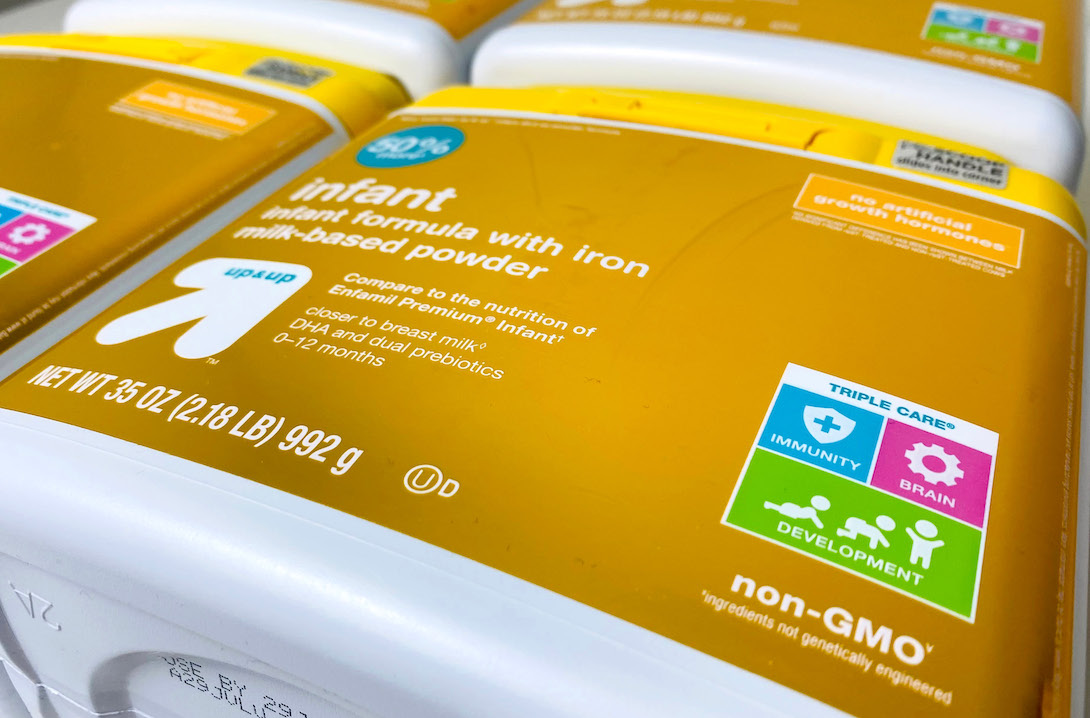Table of Contents
Target brand baby formulas retail under the name “Up & Up.”
Nutritionally comparable to corresponding big name-brand formulas, Up & Up is ½ as expensive and, in many aspects, virtually identical to the Enfamil and Similac formulas they are modeled after.
But are they any good? Is the switch worth the squeeze?
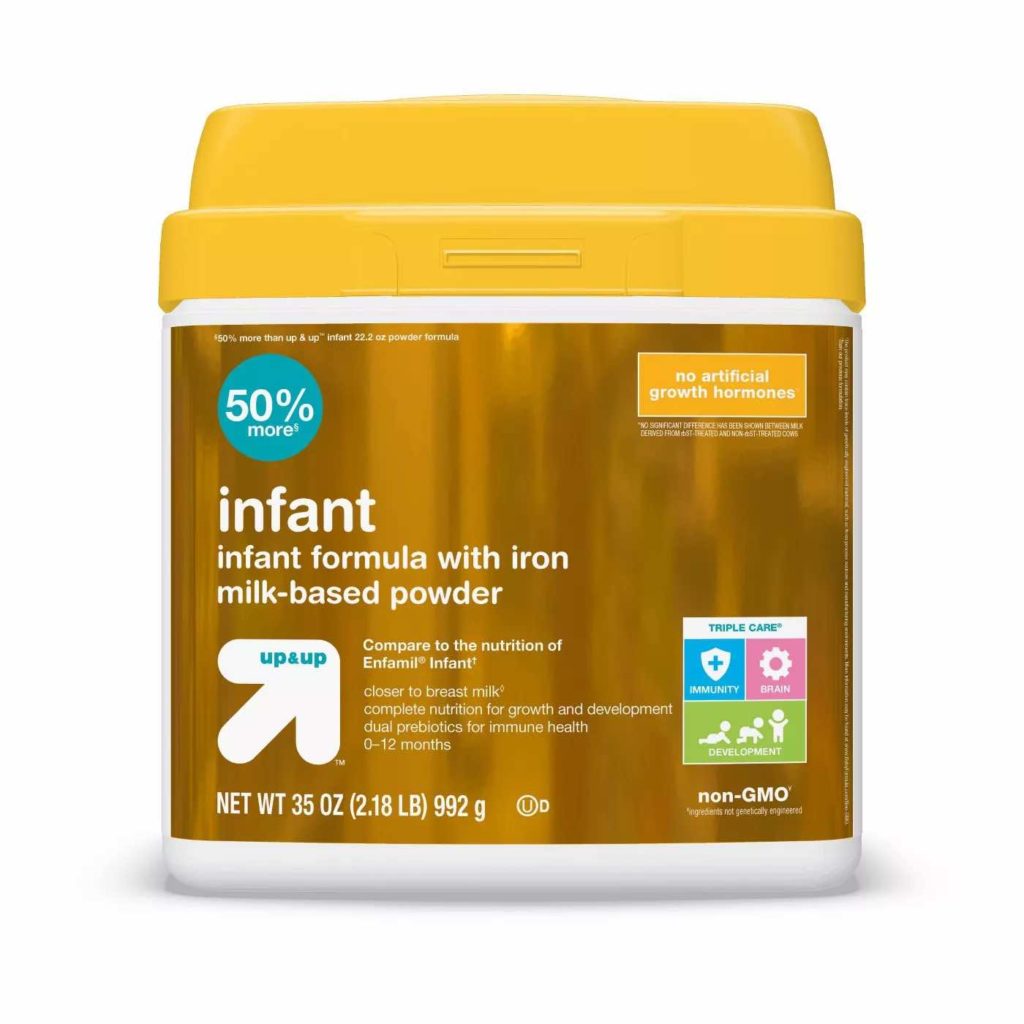
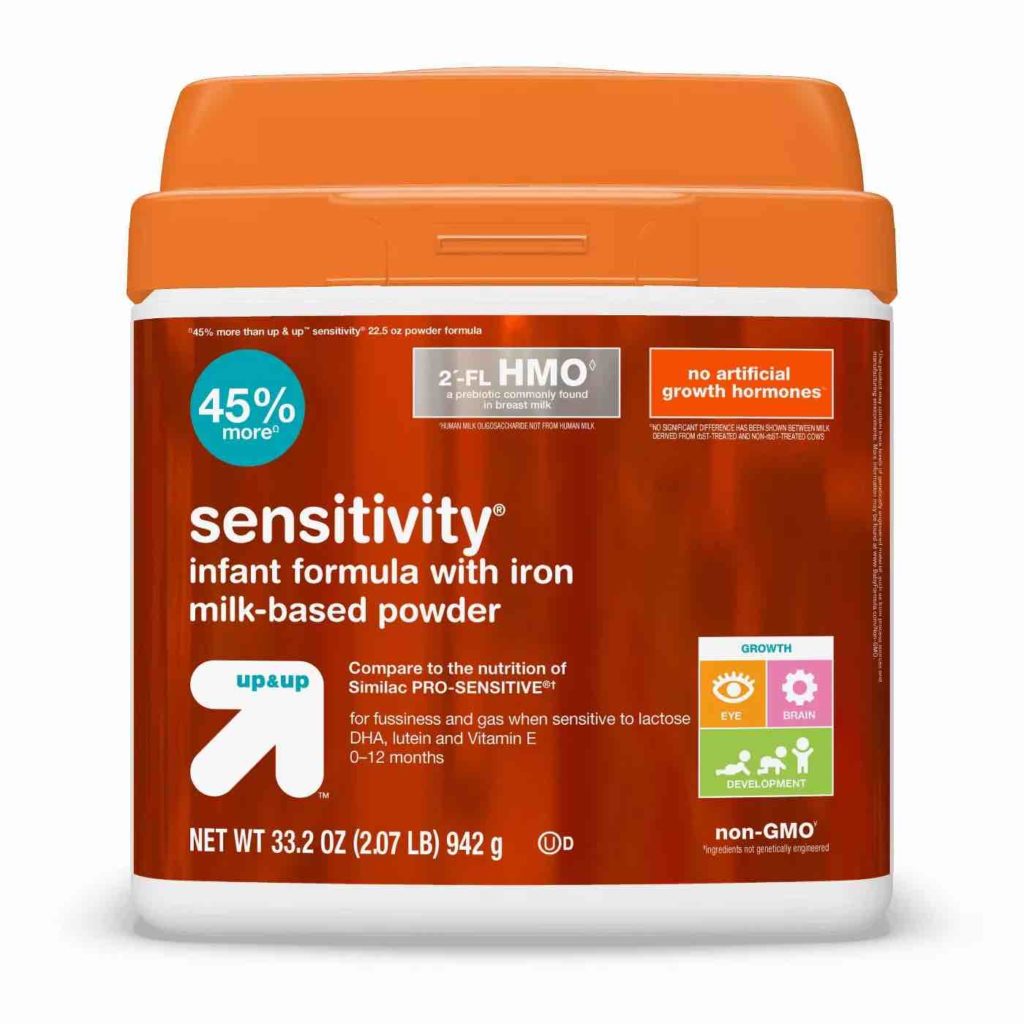
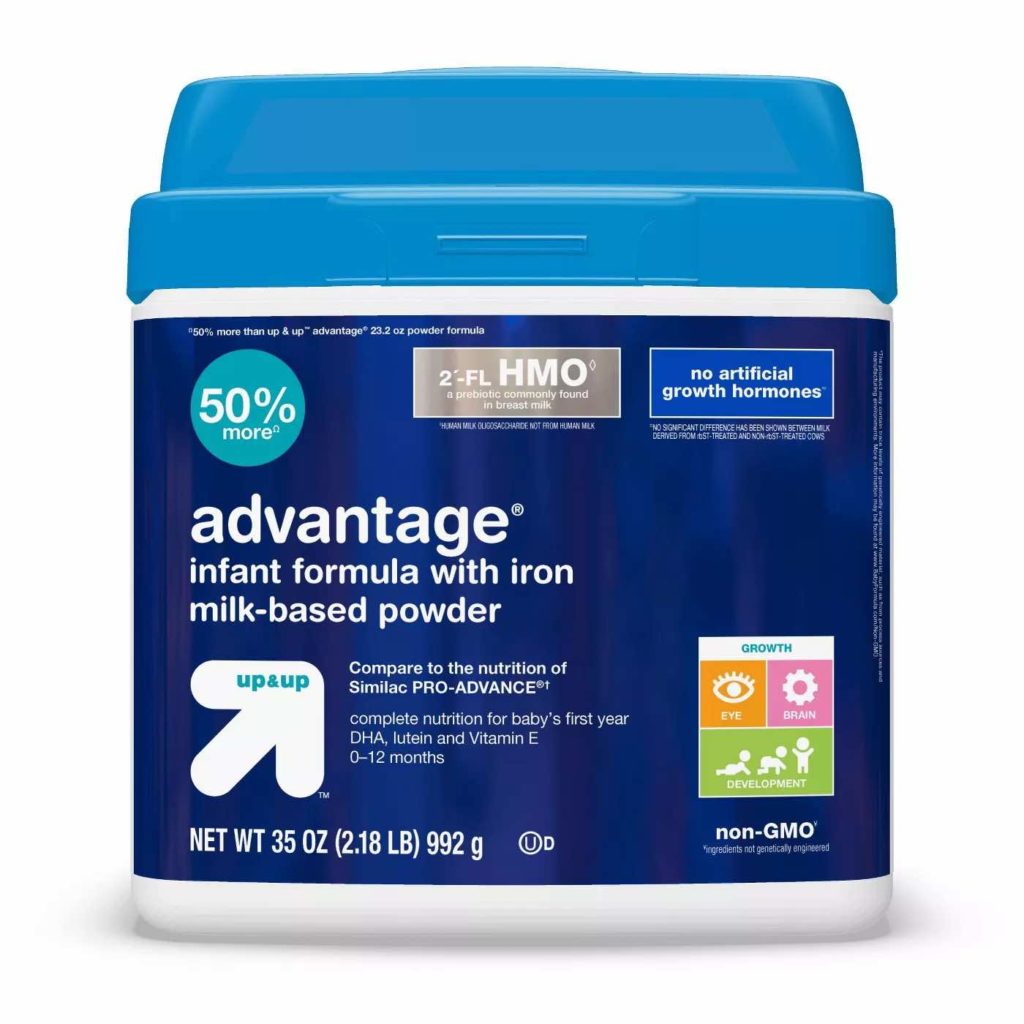
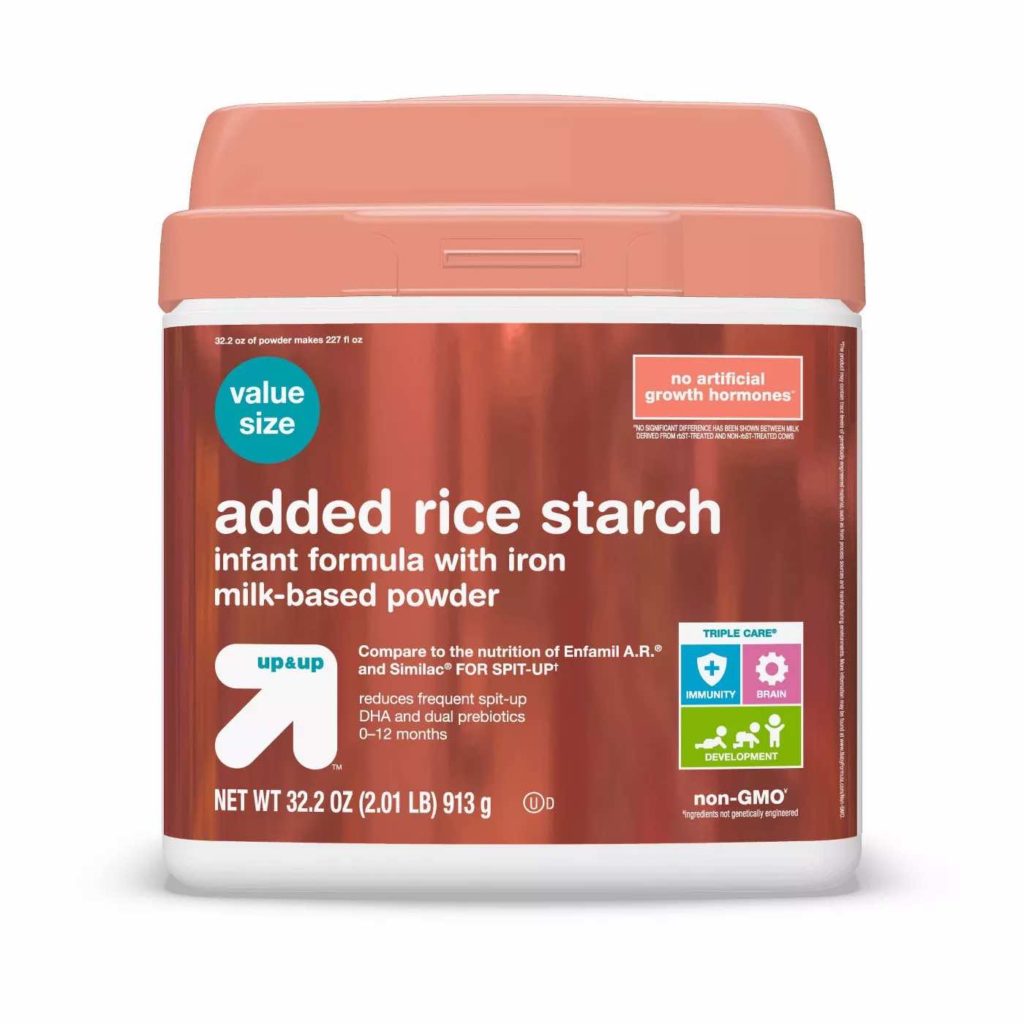
“We are mindful of the lid and label colors used by the national brands when we design the packaging for our store brand infant formulas. This means–in most cases—families are more easily able to find a specific formula and compare the nutrition and price. (The big difference is the price.)”
Manufacturer of Target’s Up & Up Infant Formula
| Target Brand Baby Formula | Compares To |
| Target Brand Up & Up Infant | Enfamil® Premium Infant® |
| Target Brand Up & Up Gentle® | Enfamil® Gentlease® |
| Target Brand Up & Up Added Rice Starch | Enfamil® A.R.® and Similac® for Spit-Up |
| Target Brand Up & Up Advantage® | Similac Pro-Advance® |
| Target Brand Up & Up Sensitivity® | Similac Pro-Sensitive® |
| Target Brand Up & Up Complete® Comfort | Similac Pro-Total Comfort® |
| Target Brand Up & Up Soy | Similac® Soy Isolmil® and Enfamil® ProSobee® |
Target Brand Baby Formula in Brief
- 85% of parents recommend Target brand baby formula.
- Target’s baby formula is half the price of comparable name-brand formulas.
- Target’s Up & Up Infant may be a great alternative to Enfamil’s Premium Infant and Enfamil’s NeuroPro.
- Target’s Up & Up, Enfamil’s Premium, and Enfamil’s NeuroPro ALL have average ratings of 4.6 stars.
Because babies are each so unique, it’s often simply unhelpful, presumptive, and inaccurate to make blanket claims and recommendations.
Thus this article reviews and consolidates data on the key points that a majority of parents would likely consider when deciding whether to switch formulas and give Up & Up a try.
Have I used Up & Up personally? Yes. Do I think it’s a great formula? Yes, if your baby is into it—and it appears that 85 or so percent of parents feel similarly. (Please always consult your own primary physician or pediatrician as this data is offered as general information only.)
“Parents should ask their infant’s health care provider if they have questions about selecting a formula for their infant.”
U.S. Food & Drug Administration
Pros & Cons of Target Brand Baby Formula
- Target’s Up & Up baby formulas are inexpensive.
- The entire Up & Up baby formula product line is non-GMO.
- Up & Up is produced by a national infant formula leader in FDA-inspected facilities within the U.S.
- The nutritional value of Target’s Up & Up baby formulas is comparable (virtually identical in most cases) to their “counterparts” from more expensive brands.
- Most parents may find that their babies do just as well on a generic formula from Target as they might currently be doing on a more expensive name-brand product.
- While the nutritional values of Target’s baby formulas are virtually identical, there are some variations in the ingredients.
- According to the ‘Baby Formula Expert,’ these ingredient variations are worth more carefully considering if your baby has or did have a problem which the Enfamil or Similac formula they are now on has resolved for them.
Target’s Brand Baby Formula: Up & Up Infant vs. Enfamil Premium Infant
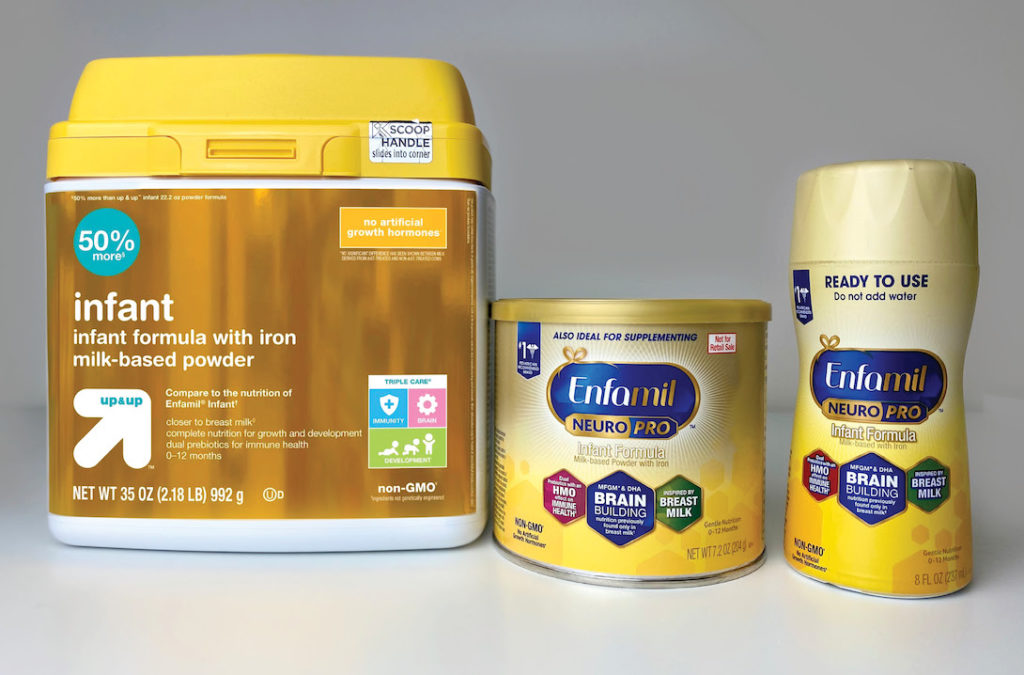
Target and the company it outsourced development and manufacturing to—PBM Nutritionals, LLC—says that the nutritional values listed on their Infant formula label (above left) are “based on [Enfamil] label claims as of June 2017 and are subject to change.”
That change has since happened.
In 2018, Enfamil (Mead Johnson & Co.) discontinued its Premium Infant formula “due to the launch of our Enfamil NeuroPro Infant,” they write in a May 2018 tweet.
NeuroPro (above right) may or may not be a better formula than Premium was. It is a more expensive one.
Hello, Amanda! We have discontinued our Enfamil PREMIUM Infant due to the launch of our Enfamil NeuroPro Infant. I’m very sorry. Please know that we would expect a baby to tolerate our Enfamil PREMIUM Infant and Enfamil NeuroPro Infant equally well. – Erin
— Enfamil (@Enfamil) May 9, 2018
85% Percent of Parents Recommend Target Brand Baby Formula
Target brand baby formula is available only at Target stores or through its website. According to reviews of the product, it has an average rating of 4.6 stars and eighty-five percent (85%) of parents recommend it.
The 15% who rated it poorly or who don’t recommend it say that the formula wasn’t agreeable with their baby—causing baby to spit, poop, or have gas—or that a “brown floater” or “brown clump” showed up in the formula possibly indicating quality control concerns.
Brown Specs in Target Brand Baby Formula (“Floaters”)
In six months of use, I’ve yet to personally come across the brown specs or floaters occasionally mentioned in reviews.
But another user offers insight into these.
In a September 18, 2021 review, Angela, a buyer of the formula, says she contacted the manufacturer about the “brown specs” that users have commented on. “They said it’s harmless—only undesirable in appearance.” She also rates Up & Up 5-stars in all categories: Easy to prepare, Easy on tummy, Value, and Quality.
“People have commented on the brown specs but I wanted to let all of you know that it’s scorched or burnt formula. It’s completely harmless. I contacted the manufacturer, Perrigo, who makes storebrand formulas for Target and others and they said it’s harmless—only undesirable in appearance. I highly recommend you try this for your infant if you are looking to save money.”
Angela, Target Brand Baby Formula User, September 18, 2021
Target’s Up & Up, Enfamil’s Premium, and Enfamil’s NeuroPro Are Each Rated 4.6 Stars by Users
Target’s Up & Up Infant formula is rated 4.6 stars by parents on Target.com. Enfamil Premium Infant formula (discontinued) and its replacement, Enfamil NeuroPro, are both likewise rated an average of 4.6 stars by users (on Walmart.com, where both new and old product entries still live on.)
| Baby formula brand | Overall average buyer rating |
| Target Brand Up & Up Infant formula | 4.6 stars (Target.com) |
| Enfamil Premium Infant formula | 4.6 stars (Walmart.com) |
| Enfamil NeuroPro Infant formula | 4.6 stars (Walmart.com) |
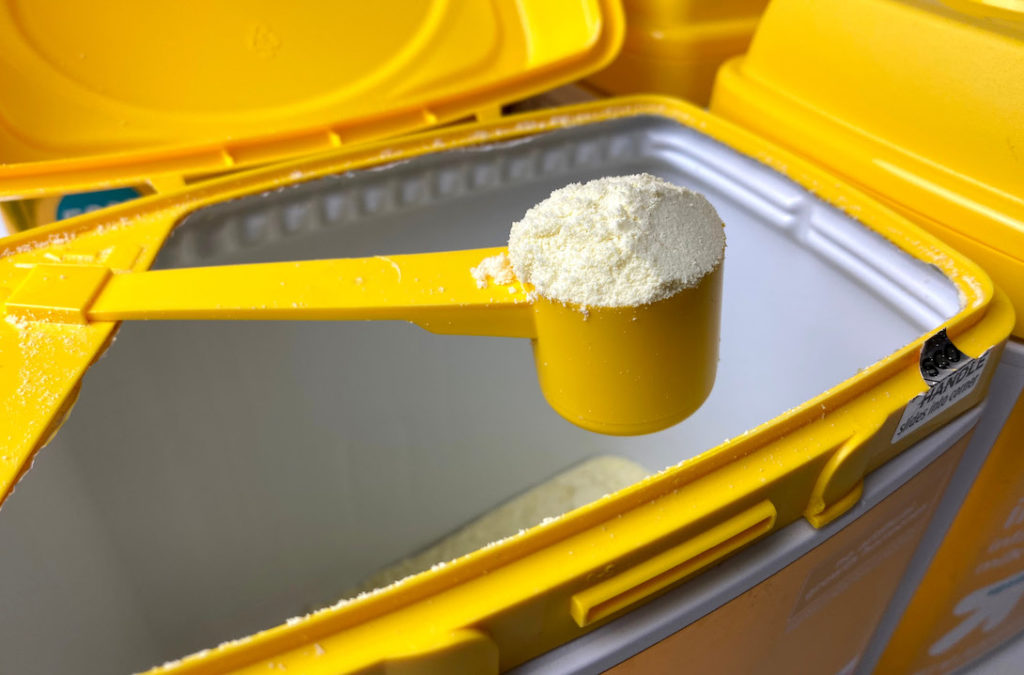
Target Brand Baby Formula is Less Than ½ the Cost of Some Name-Brand Formulas
- Target’s Up & Up retails for $19.99 for a 35-ounce tub. The 35-ounce tub yields “approximately 254 fl oz of formula,” giving us a price-per-ounce of $0.08.
- Enfamil Premium Infant is discontinued, but it sold for $27.33 for a 22.2-ounce tub that made “approx. 159 fl oz” of formula, giving us a price-per-ounce of $0.17.
- Enfamil Premium’s replacement, NeuroPro, sells for $27.98 – $33.49 for a 20.7-ounce tub that “makes approx. 148 fl oz” of baby formula, giving us a price-per ounce of about $0.21.
| Baby formula brand | Cost per fluid ounce of formula |
| Target brand Up & Up infant formula | $0.08 |
| Enfamil Premium Infant formula | $0.17 |
| Enfamil NeuroPro infant formula | $0.21 |
Target’s Up & Up Infant is less than half the cost of its name-brand counterpart. Choosing Target brand baby formula could cut your feeding costs in half.
Up & Up Tips from 12 Months of Use:
- Be careful about Up & Up’s storage: Avoid warm or sunny areas of the house, like a kitchen with windows.
- Toss the last bits of the powder if it has acquired a light “fishy” smell. This is something I’ve also noticed with other baby formulas; it tends to affect Up & Up only if left in a hot or sun-exposed area of the house.
- Get a travel container for car rides and leave the large Up & Up container at home.
Up & Up FAQs:
- Prepared but unused Up & Up formula may be “stored within 2 hours of preparation in the refrigerator,” and should then be used “within 24 hours.” Warm it before feeding to baby.
- The full container of Up & Up should be used “within 1 month” of opening the package.
- Up & Up should not be frozen for storage, and extreme temperatures should be avoided.
Up & Up Product Label Details:
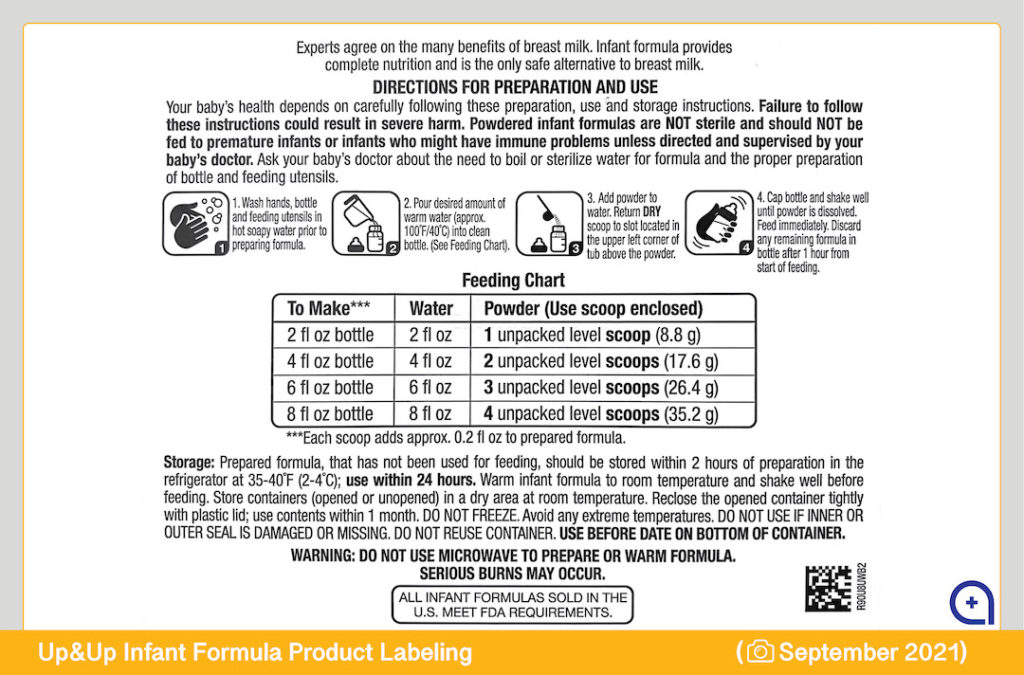
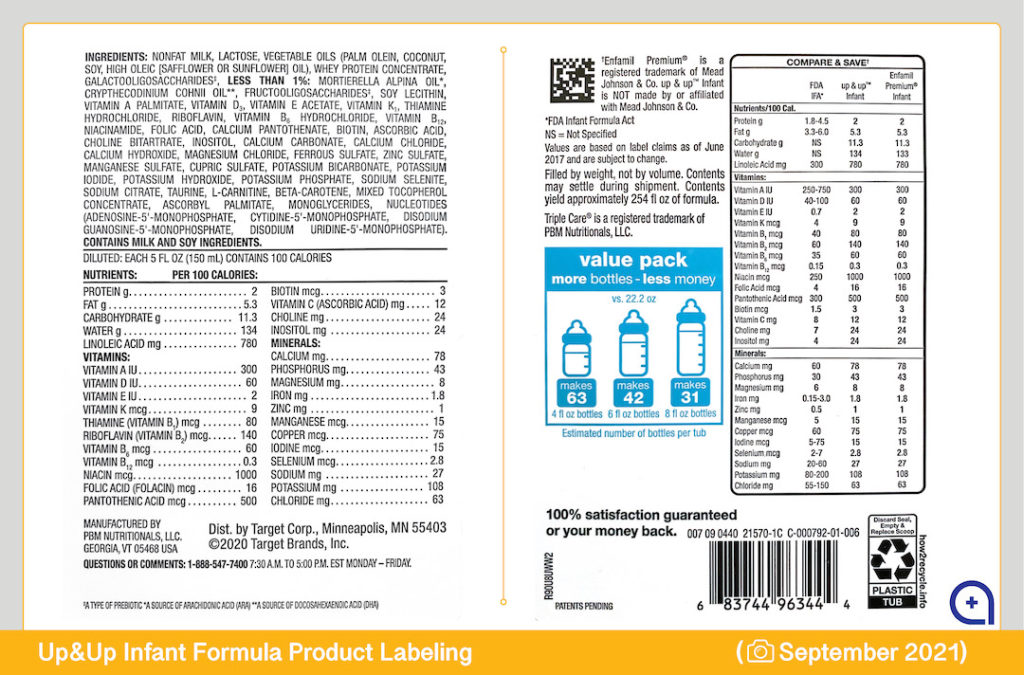
What ‘the Baby Formula Expert’ Says
In a March 2018 video, Ph.D. and certified lactation consultant Bridget Young, the Baby Formula Expert, discusses Target’s Up & Up.
If you’re considering switching to Target’s mainline generic for Enfamil, Up & Up could be a “huge winner” for you, says Dr. Young.
“The summary is I think the Up & Up Infant is a huge winner if you are feeding Enfamil Infant,” she says. “Because obviously it’s going to save you a lot of money, and the ingredients are almost identical.
“And the only difference that I can see from the list of the ingredients is this slight difference in the minor prebiotic.”
But she’s not as excited about Target’s Gentle—it’s generic for Enfamil Gentlease.
“This is a big no-no to me for generics.”
“It’s quite different….. The protein is very different.”
“If you are feeding Target Gentle and it’s working for you, fantastic. Don’t switch.
“But if you are feeding [Enfamil’s] Gentlease and it’s working but you’re thinking, ‘oh my gosh, I could save so much money by switching,’ I would probably really recommend that you don’t, at least not to the Target brand of Gentlease, because the protein source is extremely different and, more importantly, this difference is likely to cause a reaction in a baby who has benefited from a partially hydrolyzed protein.”
As for Target’s Advantage generic for Similac Pro-Advance, “This one is okay,” she says, adding caveats that if your little one was prone to painful gas, firm stools, or constipation, stick with Similac Pro-Advance.
U.S. FDA on Generic Baby Formulas
The U.S. FDA answers the question of whether “generic infant formulas differ nutritionally from name-brand formulas?”
According to the FDA, “All infant formulas marketed in the United States must meet the nutrient specifications listed in FDA regulations.”
“Infant formula manufacturers may have their own proprietary formulations but they must contain at least the minimum levels of all nutrients specified in FDA regulations without going over the maximum levels, when maximum levels are specified.”
(This article on heavy metals found even in ‘organic’ baby foods may also factor into your decision on whether to go with a generic formula. All affected baby foods were from major manufacturers, including Gerber, Beech-Nut, Campbell, and Walmart.)
Target Brand Baby Food Manufacturer
Target’s infant formulas are manufactured by PBM Nutritionals LLC, a company that also develops, manufactures, and distributes OTC and generic prescription meds, nutritional products, and pharmaceutical ingredients.
At U.S. FDA-inspected facilities located in Vermont and Ohio, PBM Nutritionals manufactures every store brand or generic infant formula sold within the United States—at Walmart, Target, Costco, Kroger, CVS, Walgreen’s and more.
Their facilities and infant formulas are subject to the exact same regulations that any brand name manufacturer has to live up to.
As for Up & Up, its price, user ratings, quality, and nutritional content all appear to be positives.
The last question left is one that no article or forum can answer and it’s asked of babies everywhere by their parents daily:
“Do you like it?”
2024 Update: ‘Graduating From’ Up & Up Baby Formula
Since this article has gotten 17,000+ views in a few years, here’s an update as of December 2024:
- All of the above remains accurate to my knowledge; basic facts rechecked, etc.
- After 9-12 months of Up & Up baby formula, we moved on. Not to another brand of baby formula, but to….
- Organic milk, which was generally great for about 6 months, except for one trip we did where we were out in the sun almost all day (90-98 °F). Milk is healthy but [possibly] not hydrating enough, so that hot trip ended it for us a bit roughly. [U.S. CDC says, “At 12 months old (but not before), your child can be introduced to cow’s milk.”]
- Then to Electrolytes and Water. After milk for a few months, we moved to electrolytes and water, which has been great. I’m not suggesting electrolytes and water are a good long-term formula replacement for infants, but remember, our child is now a “threenager,” so wouldn’t be drinking formula anyway. For 12-15 months we’ve been using electrolytes and it’s been great. We’ve mostly used “Dr. Price’s” electrolytes from Amazon, and “Stur” from local stores.
- Notes on Stur Electrolytes: Great product (see images below), but very strong, so we only put about 1/4 of a pack into a 16 ounce bottle of water, rather than the entire pack as Stur recommends (for adults). We’ll also usually ask if our little one (now 48 months old) wants regular or strong “nighttime water,” and adjust the amount of Stur we add. Let’s say we’ve been out all day and she’s exhausted, versus a regular day or mixed indoor/outdoor activity.
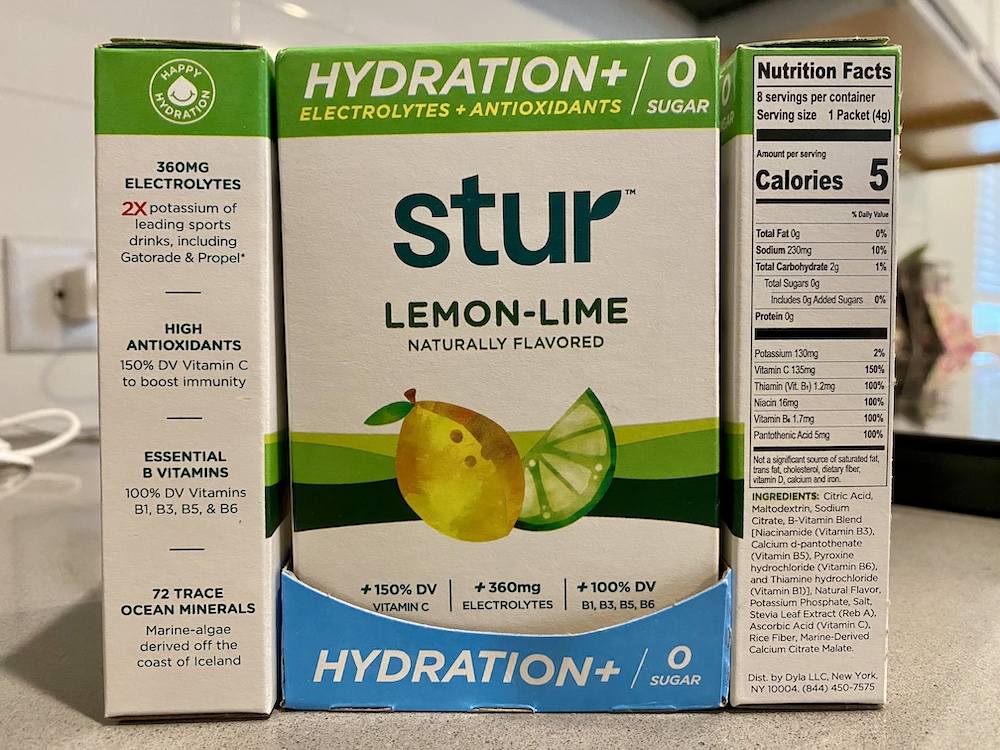
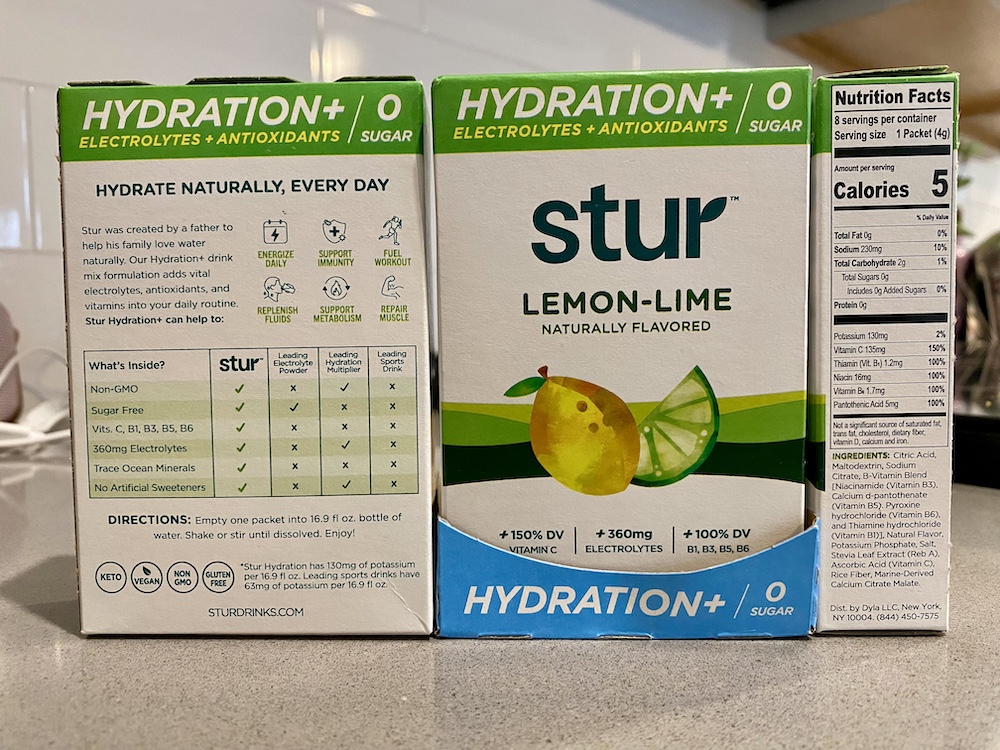
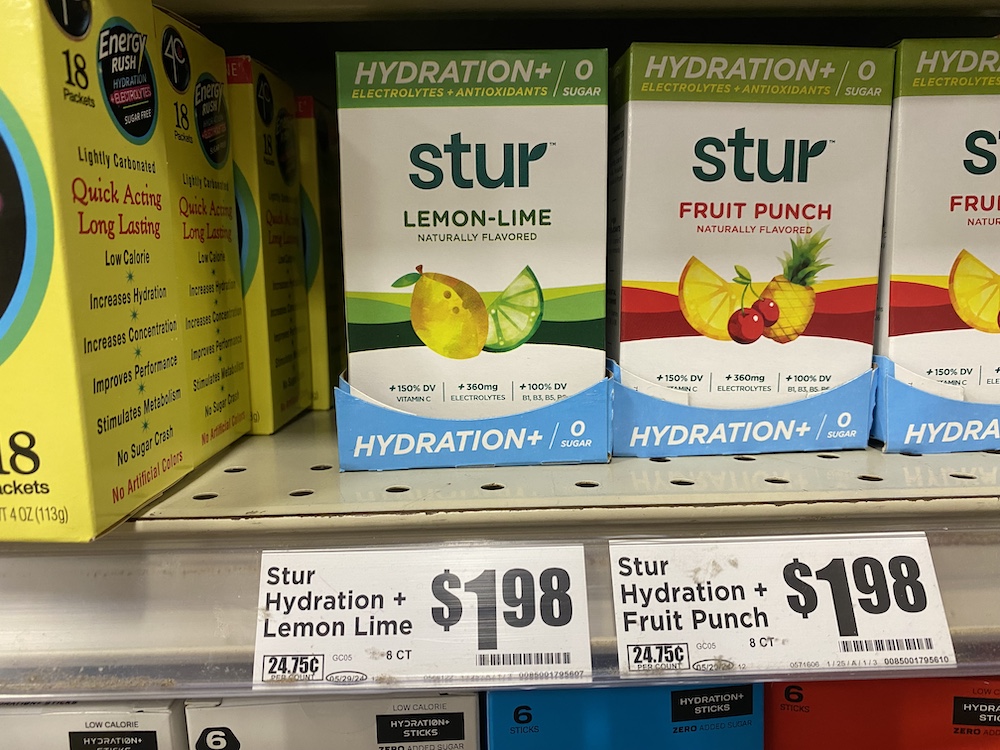
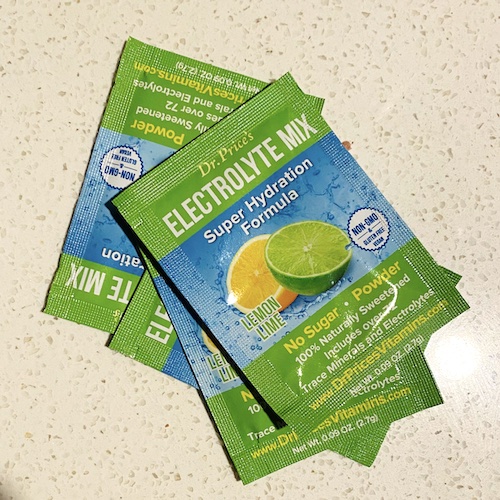
References
1. U.S. FDA “Questions & Answers for Consumers Concerning Infant Formula,” 03/07/2018 2. Baby Formula Expert, Mar 26, 2018 3. PBM Nutritionals, LLC 4. Product packaging; seven months of product use by the author. 5. Target.com user reviews and ratings


